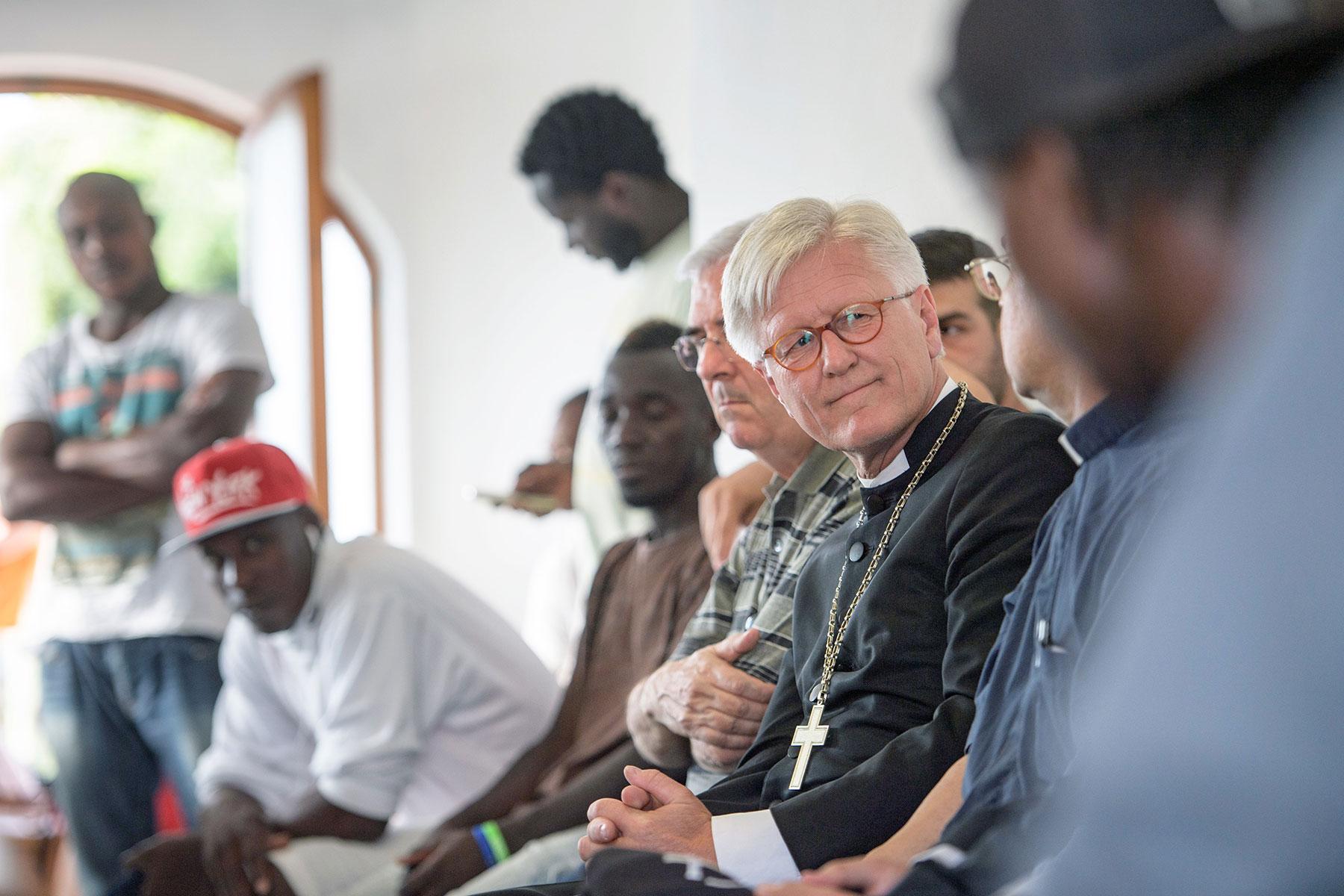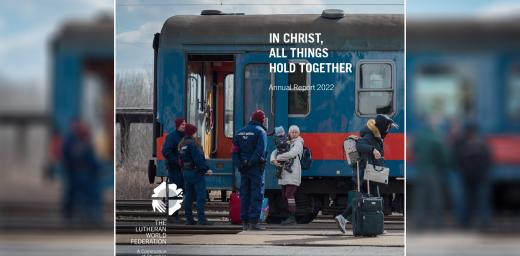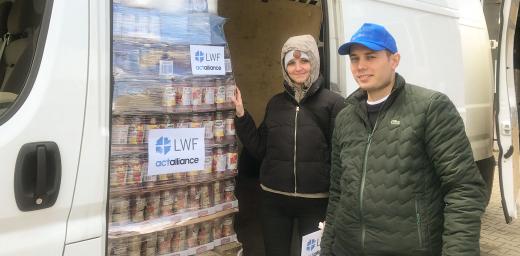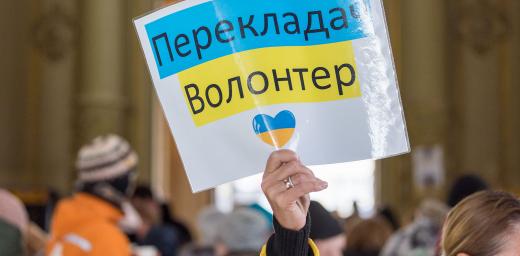Germany: Advocate for the rights of refugees

In this Voices from the Communion, Bishop Heinrich Bedford-Strohm of the Evangelical Lutheran Church in Bavaria talks about the global refugee crisis, a protestant search-and-rescue mission and the biblical roots of welcoming the stranger.
Voices from the Communion: Bishop Heinrich Bedford-Strohm
(LWI) - "Europe is losing its soul!” Heinrich Bedford-Strohm does not mince words when it comes to the situation of refugees in the Mediterranean Sea. The bishop of the Evangelical Lutheran Church in Bavaria and head of the council of Protestant Churches in Germany (EKD) is one of the strongest supporters for a search-and-rescue mission in the Mediterranean. He supports the Protestant initiative “United 4 Rescue” to send its own ship, and has been a strong advocate for the rights of refugees and migrants.
On World Refugee Day, Lutheran World Information (LWI) talked with him about the rescue mission, dealing with critics in the church, and much needed steps to address the global refugee crisis.
In the past weeks, the refugee crisis has been eclipsed by the COVID-19 crisis ...
In the past months our church has strongly focused on how we can support those whose lives have been disrupted by the coronavirus – people, who have lost their livelihood or even a loved one without being able to say farewell. Support for one does not negate solidarity with another. It was necessary to regularly raise awareness about the disastrous consequences of the pandemic in the refugee camps worldwide and also to the risks of cramped accommodation in refugee reception centers here in Germany.
How have you kept up church ministry to refugees during the COVID-19 restrictions?
The staff and volunteers in our refugee services have kept in contact with refugees here in the last months. As a church, we have provided emergency funds for our diaconal agency to benefit vulnerable groups.
Because of COVID-19, the rescue ship for the Mediterranean has not been able to leave port. When is it going to sea?
Just before the coronavirus restrictions, the Seawatch 4 was taken to the shipyard in Spain to be reconstructed for search and rescue operations. This work had to be interrupted due to the lockdown in Spain. Meanwhile, reconstruction has resumed. We hope that the ship can leave the harbor for its rescue operations in the summer.
You are very active in social media. Do you follow what is happening in the Mediterranean?
Yes, I receive alerts on my mobile phone when people are in direct danger on the Mediterranean. I have also used that information to appeal for urgent assistance.
How do you deal with it when you hear of an emergency and can’t help?
It really upsets me. Regarding the Mediterranean, that is one of the most important reasons I advocate for supporting the civil search and rescue operations. Nevertheless, I often struggle with the feeling of not having done enough for people in distress. That is something I can only put in God’s hand.
You have been criticized a lot for this commitment. How do you personally reconcile advocacy for refugees with pastoral care for people in the church who reject refugees?
The keyword here is dialogue. I have had very good experiences with direct conversation. For example, when people fear that search and rescue will lead to a huge wave of refugees, I point to the relatively low numbers of refugees. Above all, however, I ask: Do you want to just let people drown? Normally, no one answers yes to that question.
Why should Christians advocate for refugees?
The commandment of love that Jesus gave us inseparably connects the love of God and the neighbor. The commandment to love applies to the neighbor next door just as much as to neighbors far away. Hence, it is no coincidence thatin his vision of the Last Judgment in Matthew 25, Jesus says: “I was a stranger and you welcomed me.” It is incredible that Jesus, in whom God comes to us, identifies so directly with the stranger who asks to be given hospitality. Christians cannot be indifferent to this.
Search and rescue, emergency accommodation, counseling: does the church step in when the government fails?
I wouldn’t put it like that, as we cooperate with the government at many points in our refugee service. The German government finances the greater share of social work for asylum seekers. But of course, there are also points at which we have to compensate for the failure of the state. In my eyes, it is a scandal that the European member states have completely opted out of search-and-rescue operations. The civilian crews are the only ones who still rescue anyone.
What would be your request to the national governments in the worldwide refugee crisis?
The most important one is to tackle the reasons why people flee. Then we need a more just global economic system, but also more energetic action against climate change, which is already driving people from the Global South..
Concerning the 70-million people who are currently refugees, my wish is, above all, that all states can play a part in showing solidarity with them. It impresses me, again and again, to see how poor countries in Africa take in millions of refugees. When I see how rich countries of Europe struggle to accommodate a few thousand, I am ashamed of my continent.
It’s a pretty poor show that it has still not been possible to establish a reliable European distribution mechanism for people rescued from the Mediterranean. You do not see much of Europe’s Christian roots physically,, although those roots are often rhetorically invoked.
The Evangelical Lutheran Church of Bavaria participates in the LWF project “Symbols of Hope”, which aims to show young people in Africa alternatives to irregular migration. What specific value do you see in churches getting involved in such projects?
This is an excellent project. After all, it’s always better when people are shown opportunities in their home countries instead of setting out on the deadly route through the desert and end up in Libyan camps in which human rights are disregarded. Raising awareness about such projects is also important when we are accused of bringing as many people from Africa to Europe as possible.
The additional burdens of refugees to their host communities are often discussed. What do they bring to their host community?
This question is answered wherever people with different cultural backgrounds meet, and become friends.
The Lutheran World Federation is a global body that shares the work and love of Christ in the world. In this series, we profile church leaders and staff as they discuss topical issues and set out ideas for building peace and justice in the world, ensuring the churches and communion grow in witness and strength.





